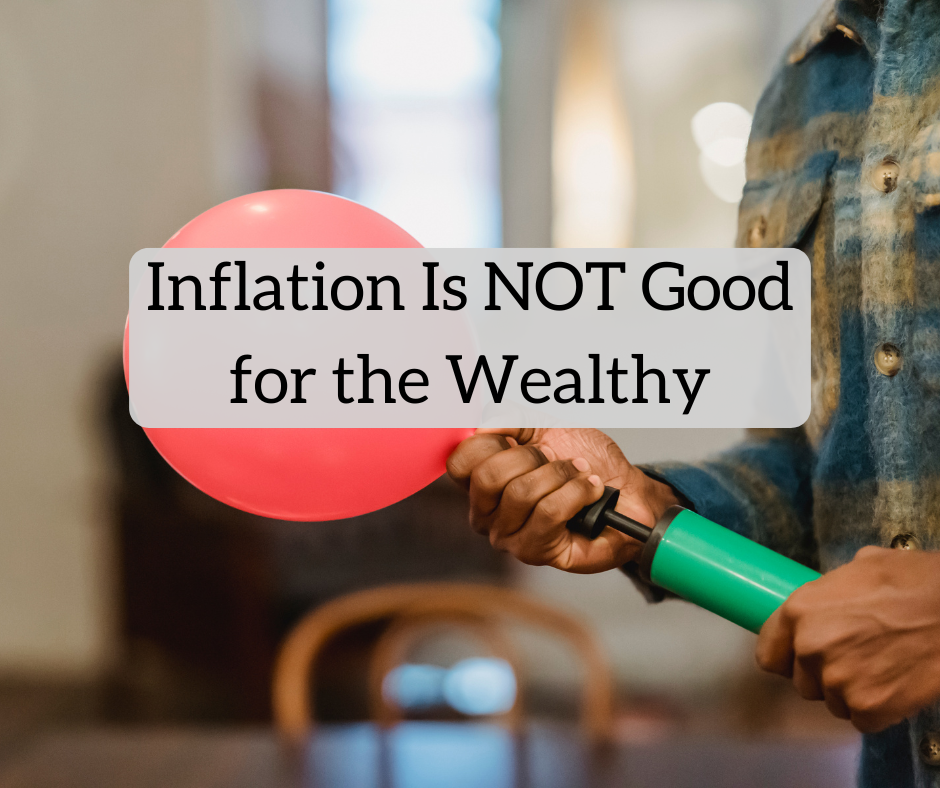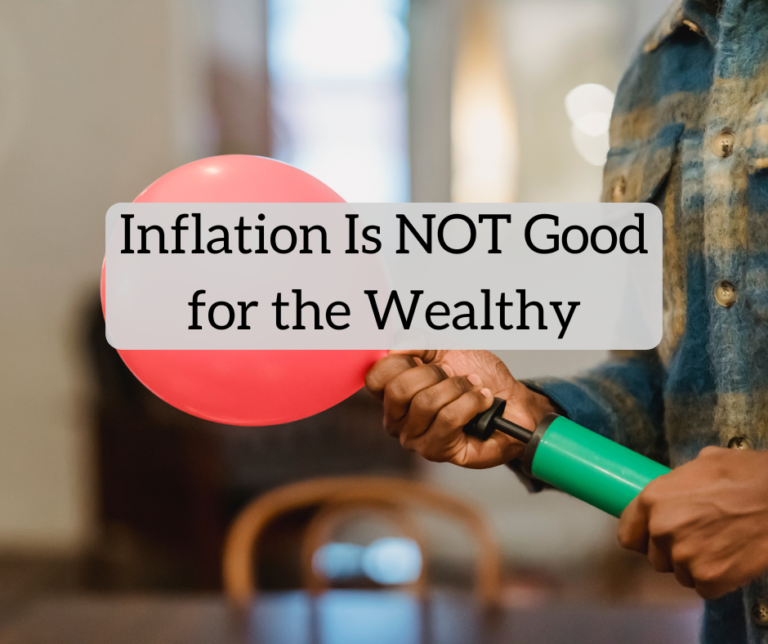
Inflation Is NOT Good for the Wealthy
By Dr. Jim Dahle, WCI Founder
Bạn đang xem: Inflation Is NOT Good for the Wealthy
I’ve seen an idea popping up on forums, blog posts, and other places on the internet that seems to suggest that inflation benefits the wealthy. That idea is bonkers, and I’ll tell you why.
What We’re Talking About

Inflation is an increase in the cost of a good or service, i.e. when something that used to cost $10 now costs $12, that’s 20% inflation. When, on average, most of what society is buying goes up in price, that is considered an inflationary environment. However, people don’t really worry much about 1%-3% inflation. In fact, the Federal Reserve actually targets a rate of inflation of 2%. There isn’t anything magic about 2%; that figure was just pulled out of the air (though most economists do think the best number is between 1% and 3% a year). The point of a target is that inflation needs to be stable and what is expected. That allows society a predictable, stable environment where people can borrow, earn, save, and invest without fear of a dramatic and unexpected change in prices. The inflation we’re discussing today in this post is not that 2%ish level of inflation the Fed is aiming for but what happens when inflation is higher than that.
Why People Think Inflation Is Good for the Wealthy
Most of the arguments I see suggesting inflation is good for the wealthy basically boil down to “in an inflationary environment the value of your assets like stocks, real estate, your car, and your home goes up in value and since the wealthy own more of that stuff, they do better in inflation.” That argument is bunk. It’s so bonkers that I can’t even believe that I have to disprove it.
If you buy a house that costs $500,000 and inflation is 5% and after a year your house is worth $525,000, you’re not any more wealthy than you were before. I’m sorry, you’ve made the mistake of thinking in nominal dollars rather than real, inflation-adjusted dollars. If you had sold that house a year ago, you could have used the money to buy $500,000 worth of stuff. If you sell it today, you can buy $525,000 worth of stuff. Which is exactly the same amount of stuff that $500,000 would have bought you a year ago.
The Wealthy Do Better Than the Poor in All Environments
All else being equal, it’s better to be wealthy than poor. As writer and playwright Beatrice Kaufman said, “I’ve been poor and I’ve been rich. Rich is better.” Whether you’re in a stable economic environment, an inflationary environment, or a deflationary environment, it’s better to be rich—at least economically speaking. So, we’re NOT talking about whether the rich or the poor do better in an inflationary environment. That’s not what we’re comparing here. We’re talking about whether the wealthy do better in an inflationary environment or an economically stable one.
Xem thêm : The Fed’s go-to inflation gauge ticked up less than expected last month
More information here:
Why You Must Adjust for Inflation in Long-Term Planning
You Can’t Hedge Against Inflation in the Short Term
The People Who Really Benefit from Inflation

You know who really benefits from higher-than-desired inflation? The indebted—especially those with long-term, low fixed interest rate debt. If you have one of those lower interest rate 30-year mortgages from 2020 and inflation averages 8% a year over the next 10 years, you’re basically paying off that mortgage with money that is worth 57% less than it was when you took out that mortgage. That’s a real score. Whoever owns that debt (since every debt is both a liability to someone and an asset to someone else) is getting hosed. In a deflationary environment, the opposite happens. The 30-year Treasury bondholders make out like bandits, and the debtors are ruined as they attempt to pay back their debts with ever more valuable dollars.
You know who seems to have a lot of fixed debt and not that much cash? The middle class. If we’re going to do the class warfare thing, they’re probably the ones who benefit most from inflation, all else being equal (which it never is).
If All Else Is Adjusted, Inflation Doesn’t Matter to the Rich
If all else is equal, inflation doesn’t matter all that much. It’s just a number. Inflation of 5% or 10% or 25% doesn’t really matter if everything you own goes up in value by the same percentage, if your income goes up by the same percentage, and if the government doesn’t raise your taxes. Unfortunately, all else is never adjusted, especially the taxes. This is a major problem with inflation for the wealthy.
Let’s say you own an asset that is worth $100,000. Over a few years, it goes up in value to $200,000. However, in a high inflation environment, most of that happens to be inflation such that the “real” gain is only $20,000. When you go to sell that asset, how are the taxes calculated? Do you only pay tax on $20,000? Nope, you pay them on the entire $100,000. If you have a 30% tax rate on that sale, you end up with only $170,000. You didn’t even make money in real terms since you now need $180,000 to buy what used to cost $100,000.
No, inflation isn’t a good thing for those who own assets. And the higher the inflation rate, the worse off they are after-tax.
Xem thêm : The Fed’s go-to inflation gauge ticked up less than expected last month
More information here:
Xem thêm : Russia’s central bank is ‘losing the battle’ against inflation
Side Hustles: The Real Inflation Hedge
The Real Problem with Inflation
Well, if inflation is bad for the owners of debt-free assets, then deflation must be good for them, right? Well, tax-wise sure, but otherwise it’s the same old, same old. The value of the asset went down, but you don’t need as much money to buy everything else you need. No big deal.
However, the real problem with higher-than-desired inflation and deflation is that it affects the economy in a detrimental way. People living in inflationary environments make different decisions. They don’t leave their money in the bank where it can be loaned out. They might even buy “hard assets” they wouldn’t otherwise buy. They invest differently. They work differently. They choose different jobs. It has all kinds of economic effects, and the overall effect is definitely negative.
Same problem in a deflationary environment, like an economic depression. When the economy tanks, nobody does better. The rich do badly. The poor do even worse. But it isn’t good for anyone.
Academic Studies Don’t Account for Confounding Variables
Sometimes there are studies that suggest or “prove” that the wealthy became more wealthy at the same period of time when inflation was higher than desired. The old adage, “Correlation is not causation,” applies. There are other reasons why the real wealth or real income of any given group might have gone up, but the high inflation isn’t it.
Some Assets Do Better in Inflation Than Others

Naturally, some assets do better in an inflationary environment than others. Stocks, TIPS, commodities, precious metals, and cryptocurrencies are often listed as assets that do OK during inflation while bank accounts, CDs, and bonds are generally thought to do poorly. Inflation is perhaps the greatest enemy of the investor (besides the investor’s own behavior), and every portfolio should be built to adequately deal with both expected and unexpected inflation. Of William Bernstein’s Four Horsemen of the Apocalypse (Inflation, Deflation, Confiscation, and Devastation), inflation is by far the most common. Ignore it at your own peril.
That means most people need the majority of their assets in stocks and real estate. A significant portion of your bonds, especially if a big chunk of your portfolio is in bonds, needs to be indexed to inflation with instruments like TIPS and I Bonds. You might even want a dash of speculative alternatives thought to do well in a hyperinflationary environment in the portfolio. But even if you have assets that aren’t wiped out in a nasty bout of inflation, that doesn’t mean you should get down on your knees and pray for inflation. You probably still would have been better off without it, especially after-tax.
What do you think? Agree? Disagree? Do you think you’ve done better when inflation hits? Know somebody who could use this information? Make sure to share it with them.
Nguồn: https://estateplanning.baby
Danh mục: News




